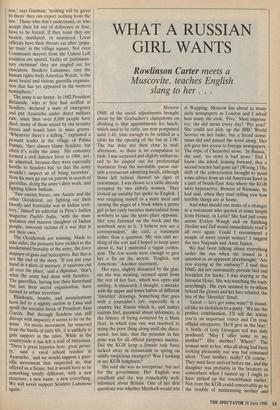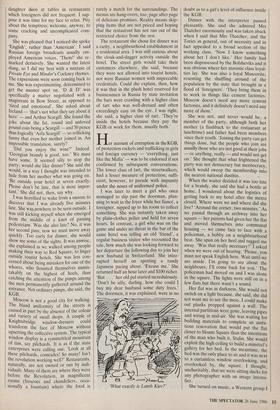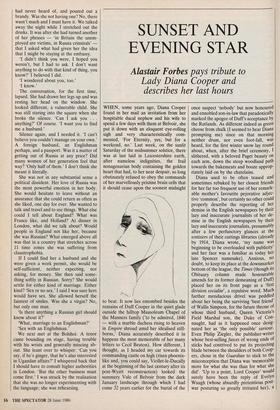WHAT A RUSSIAN GIRL WANTS
Rowlinson Carter meets a
Muscovite, teaches English slang to her . . .
Moscow ONE of the social adjustments brought about by Mr Gorbachev's clampdown on drinking is that appointments for lunch, which used to be early, are now postponed until 1.45, time enough to be settled at a table for the opening of the bar at 2.00. The bar does not then close in mid- afternoon, so there is no compulsion to rush. I was surprised and slightly embarras- sed to be singled out for preferential treatment from the inevitable queue out- side a restaurant admitting locals, although those left behind showed no signs of resentment. I was shown to a table already occupied by two elderly women. They looked up amiably but spoke no English. I was resigning myself to a mute meal and turning the pages of a book when a pretty girl in her early twenties materialised from nowhere to take the spare place opposite. Her eyes fastened on the book and the notebook next to it. 'I believe you are a correspondent,' she said, a statement rather than a question. My visa said no- thing of the sort and I hoped to keep quiet about it, but I muttered a vague confes- sion. The few words were enough to give her a fix on the accent. 'English, not American.' Another statement.
Her eyes, slightly distanced by the glas- ses she was wearing, seemed apart from the rest of her face, which was open and smiling. A mismatch, I thought; a mistake with the upper and lower halves of different `Identikit' drawings. Something that goes with a journalist's job, especially in a country like Russia which is, and makes visitors feel, paranoid about informers, is the fantasy of being cornered by a Mata Hari, in which case one was resolved to string the poor thing along until she disco- vered, too late, that the prisoner in her arms was for all official purposes useless.
Did the KGB keep a female task force tucked away in restaurants to spring on mildly suspicious strangers? Was I looking at my KGB temptress?
She said she was an interpreter, but not for the government. Her English was excellent and she was remarkably well- informed about Britain. One of her first questions was whether Murdoch would win at Wapping. Moscow has about as many daily newspapers as London and I asked how many she took. 'Five.' Most impress- ive; she did mean every day? 'Per year!' She could not pick up the BBC World Service on her radio, but a friend some- times did and passed the word along. Her job gave her access to foreign newspapers.
The topic of Chernobyl arose. 'In Russia,' she said, 'no news is bad news.' Did I know, she asked, leaning forward, that a second reactor had gone up? (Wrong.) The drift of the conversation brought to mind some advice from an old American hand in a part of South-East Asia where the KGB were hyperactive. Beware of Russians, he had said, when they start telling you how terrible things are at home.
And what should one make of a stranger in a restaurant who quoted at some length from Horace, in Latin? She had just come across Evelyn Waugh and on finishing Decline and Fall would immediately read it all over again. Could I recommend a couple of more recent writers? I suggest the two Naipauls and Amis Junior.
We had been talking about everything under the sun when she tossed in a question as an apparent afterthought: 'Are you staying at the embassy?' I said that HMG did not customarily provide bed and breakfast for hacks; I was staying at the Intourist Hotel. She was watching the reply searchingly. His eyes seemed to re-adjust behind the glasses and her face relaxed; the bits of the Identikit' fitted.
`Good — let's get some wine!' It sound- ed like an invitation to a party. 'We are the perfect combination. I'll tell the waiter you're an important visitor and I'm your official interpreter. He'll give us the best.' A bottle of tasty Georgian red was duly produced. 'May I offer some to my mother?' Her mother? Where? The woman next to her, who all along had been looking pleasantly our way but remained silent. 'Your mother, really? Of course.' They must have arrived before me, and the daughter was probably in the lavatory or somewhere when I turned up. I ought to have picked up the resemblance earlier. Not even the KGB could conceivably go to the trouble of maintaining mother and daughter duos at tables in restaurants which foreigners did not frequent. I sup- pose it was time for my face to relax. Pity about the temptress; welcome, anyway, to some cracking and uncomplicated com- pany.
She was pleased that I noticed she spoke `English', rather than 'American'. I said Russian foreign broadcasts usually em- ployed American voices. 'Them!' she re- marked derisively. She wanted the latest slang, so I did my best with a mixture of Private Eye and Minder's Cockney rhymes. The expressions were soon coming back to me. She was experimenting, determined to get the nuance spot on. 'D & D' was specifically a matter negotiated with a magistrate in Bow Street, as opposed to `tired and emotional'. She asked about Ireland — 'that's not what they say about it here' — and Arthur Scargill. She found the joke about the fat, round and unloved pound coin being a Scargill — and 50 pence thus logically 'Arfa Scargill' — so rollicking funny that even her mother joined in. An impossible translation, surely? `Did you enjoy the wine?' Indeed. `Georgian brandy is good, too.' We must have some. It seemed silly to stop the party; would she like dinner? She said she would, in a way I thought was intended to hide from her mother what was going on. `Be outside your hotel at seven exactly. Please don't be late, that is most impor- tant.' She did not, then, say why. I was horrified to wake from a snooze to discover that I was already five minutes late. She was,nowhere to be seen outside. I was still kicking myself when she emerged from the middle of a knot of passing pedestrians. Was she also late? No, it was her second pass; now we must move away quickly. Too early for dinner, she would show me some of the sights. It was unwise, she explained as we walked among people making their way to Red Square, to linger outside tourist hotels. She was less con- cerned about being mistaken for one of the whores, who flounted themselves unmis- takably on the highest of heels, than catching the attention of the pimps among the men permanently gathered around the entrance. Not ordinary pimps, she said, the KGB.
Moscow is not a good city for walking. The bland uniformity of the streets is caused in part by the absence of the colour and variety of small shops. A couple of Knightsbridge window-dressers could transform the face of Moscow without upsetting the collective system. The typical window display is a symmetrical mountain of tins, say pilchards. It is as if the state enterprises were calling out: 'Look at all these pilchards, comrades! So many! Isn't the revolution working well?' Restaurants, naturally, are not owned or run by indi- viduals. Many of them are where they were before the Revolution, in magnificent rooms (frescoes and chandeliers, occa- sionally a fountain) where the food is rarely a match for the surroundings. The menus are hang-overs, too, page after page of delicious promises. Reality means skip- ping items that are not priced and hoping that the restaurant has not run out of the restricted choice from the rest.
The restaurant she chose for dinner was a rarity, a neighbourhood establishment in a residential area. I was still curious about the cloak-and-dagger activity outside the hotel. The street girls would take their customers elsewhere, she said, because they were not allowed into tourist hotels, nor were Russian women with impeccable credentials. Could she explain, then, how it was that in the plush hotel reserved for businessmen in Russia by state invitation the bars were crawling with a higher class of tart who was well-dressed and often exceedingly easy on the eye. I was right, she said, a higher class of tart. 'They're inside the hotels because they pay the KGB or work for them, usually both.'
Her account of corruption in the KGB, of protection rackets and trafficking in girls and foreign currency — 'everything, just like the Mafia' — was to be endorsed if not confirmed by subsequent conversations. The lower class of tart, the streetwalkers, had a lesser measure of protection; suffi- cient, however, to parade with impunity under the noses of uniformed police.
I was later to meet a girl who once managed to slip past the doorman, plan- ning to wait in the foyer while her fiancé, a foreigner, nipped up to his room to collect something. She was instantly taken away by plain-clothes police and held for seven hours. In contrast, a girl who was on the game and under no threat in the bar of the same hotel was telling an old 'friend', a regular business visitor who recounted the tale, how much she was looking forward to her departure the following day to join her new husband in Switzerland. She inter- rupted herself on spotting a randy Japanese pacing about. 'Excuse me.' She returned half an hour later and $100 richer. `But . . .' her old pal started incredulously. `Don't be silly, darling, how else could I buy my dear husband some duty frees.' The doormen, it was explained, were in no `What exactly is Lamb Kiev?' doubt as to a girl's level of influence inside the KGB.
Dinner with the interpreter passed pleasantly. She said she admired Mrs Thatcher enormously and was taken aback when I said that Mrs Thatcher, and the Tories in general, out of necessity and in fact appealed to a broad section of the working class. 'Now I know something about her I don't like.' Her family had been dispossessed by the Bolsheviks and it was obvious where her atavistic class loyal- ties lay. She was also a loyal Muscovite, resenting the shuffling around of the population by the state that brought in a flood of 'foreigners'. 'They bring them in to work in things like cement factories. Moscow doesn't need any more cement factories, and it definitely doesn't need any more of them.'
She was not, and never would be, a member of the party, although both her mother (a flashback to the restaurant at lunchtime) and father had been members since their youth. 'Joining the party can get things done, but the people who join are usually those who are not good at their jobs — or anything, really — and would not get on.' She thought that what frightened the party was not democracy but meritocracy, which would sweep the membership into the nearest national dustbin.
When the waiter decided it was too late for a brandy, she said she had a bottle at home. I wondered about the logistics of getting back to my hotel after the metro closed. Where were we and where did she live? 'Around the corner, two minutes.' As we passed through an archway into her square — her parents had given her the flat and moved themselves into communal housing — we came face to face with a policeman, a bobby on a neighbourhood beat. She spun on her heel and tugged me away. 'Was that really necessary?' I asked when we were out of hearing. 'Please, you must not speak English here. Wait until we are inside. I'm going to see about the neighbours; I'll come back for you.' The policeman had moved on and I was alone in the square. The lights were still on in a few flats but there wasn't a sound.
Her flat was in darkness. She would not switch on a light because, she said, she did not want me to see the mess. I could make out planks propped against a wall. The internal partitions were gone, leaving pipes and wiring in mid-air. She was waiting for building materials to complete an ambi- tious renovation that would put the flat closer to Sloane Square than the intentions of the man who built it, Stalin. She would exploit the high ceiling to build a minstrel's gallery for her bed. In the meantime, the bed was the only place to sit and it was next to a curtainless window overlooking, and overlooked by, the square. I thought, uncharitably, that we were sitting ducks for any photographer with an image intensi- fier.
She turned on music, a Western group I had never heard of, and poured out a brandy. Was she not having one? No, there wasn't much and I must have it. We talked away the night while I stretched out the drinks. It was after she had turned another of her phrases — 'in Britain the unem- ployed are victims, in Russia criminals' that I asked what had given her the idea that I might be staying at the embassy.
`I didn't think you were, I hoped you weren't, but I had to ask. I don't want anything to do with that kind of thing, you know?' I believed I did.
`I wondered about you, too.'
`I know.'
The conversation, for the first time, lapsed. She had drawn her legs up and was resting her head on the window. She looked different, a vulnerable child. She was still staring into the square when she broke the silence. 'Can I ask you . . . anything?' Of course. 'I want you to find me a husband.'
Silence again, and I needed it. 'I can't believe you couldn't manage on your own.' A foreign husband, an Englishman perhaps, and a passport. Was it a matter of getting out of Russia at any price? Did many women of her generation feel that way? 'Only half of them.' I don't think she meant it literally.
She was not in any substantial sense a political dissident. Her love of Russia was the most powerful emotion in her body. She would hesitate to leave without an assurance that she could return as often as she liked, one day for ever. She wanted to talk and travel and to see things. What else could I tell about England? What was France like, and Holland? At dinner in London, what did we talk about? Would people in England not like her, because she was Russian? What emerged above all was that in a country that stretches across 11 time zones she was suffering from claustrophobia.
If I could find her a husband and she were given a work permit, she would be self-sufficient, neither expecting, nor asking, for money. She then said some- thing softly in Russian. Sorry? She would settle for either kind of marriage. Either kind? 'Sex or no sex.' I said I was sure hers would have sex. She allowed herself the faintest of smiles. Was she a virgin? No, but only one man.
`Is there anything a Russian girl should know about it?'
`What, marriage to an Englishman?' `Sex with an Englishman.'
We next met at the Bolshoi. A tenor came bounding on stage, having trouble with his wrists and generally mincing ab- out. She leant over to whisper: 'Can you say, if he's ginger, that he's also interested in Ugandan affairs?' I whispered back that I should have to consult higher authorities in London. 'But the other business must come first.' I was struck by the realisation that she was no longer experimenting with the language; she was rehearsing.




















































 Previous page
Previous page